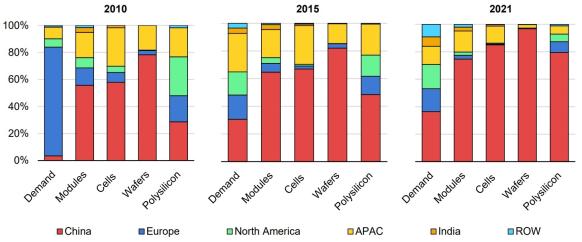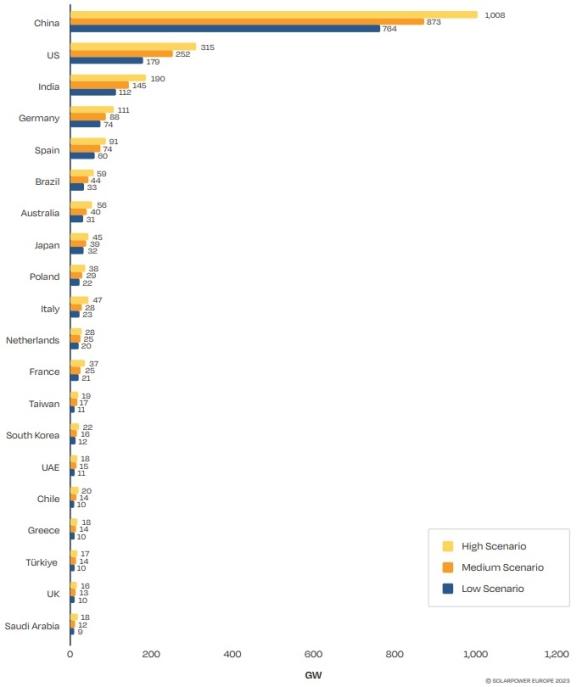EU unveils grid action plan; European companies warn against import tariffs
The solar news you need to know.

Related Articles
EU identifies 68 priority projects in grid acceleration plan
The European Union has identified 68 electricity grid projects that will gain priority access to permits and EU funding in a new plan to accelerate grid expansions and accommodate growing renewable energy capacity.
The EU aims to install 1,000 GW of solar and wind capacity by 2030, compared with 400 GW in 2022, requiring 584 billion euros ($637 billion) of investments in the power grid, the European Commission said in a statement.
To this aim, the EC has identified 68 grid projects, along with five smart grid projects and 12 offshore wind infrastructure projects, as projects of common interest (PCIs) that are eligible for funding from the EU's Connecting Europe Facility.
These 85 projects address the "most pressing bottlenecks" in the EU transmission networks and around half are scheduled to be commissioned in 2027-2030, the EC said.
"Their timely completion is key to ensure that they can have an impact within this decade. Avoiding the slippages and delays that hampered PCI completion in the past requires an extra effort of monitoring progress and swiftly removing bottlenecks and obstacles to implementation," the commission said.
Cross-border transmission capacity must double in the next seven years, including an additional 23 GW by 2025 and a further 64 GW by 2030, the EC said.
The EC will also work to improve long-term planning of grids, improve access to finance for transmission projects and stimulate faster permitting for grid projects through technical support and guidance, it said.
EU solar companies warn against import tariffs
More than 400 solar power companies have warned the European Union not to launch a trade investigation that could lead to tariffs on imported solar products from China.
Solar deployment must accelerate to reach the EU's goals of 42.5% of power from renewable energy by 2030 and defensive trade measures would slow down deployment and severely curb solar employment, the companies warned in a joint statement coordinated by industry group SolarPower Europe.
The warning came ahead of a meeting of solar industry chiefs, national ministers and the EU commissioner for the internal market, Thierry Breton, to assess measures to bring production back to Europe. The EU aims to install 30 GW/year of production capacity along the full solar supply chain by 2025. The region currently hosts 8 GW/year of module production and far less cell, ingot and wafer capacity.
China dominates the global supply of solar components and a sharp fall in global solar prices and an oversupply of supplies from Chinese companies has pushed more European solar manufacturers close to bankruptcy, requiring further support measures from EU authorities, SolarPower Europe said in an earlier letter to the European Commission (EC) in September.
Solar manufacturing capacity by region
(Click image to enlarge)
Source: International Energy Agency's Report on Solar PV Global Supply Chains, August 2022
Rather than trade barriers on Chinese products, the EU should adapt regulation that temporary loosens state aid rules so that it allows countries to support the running costs of existing factories, the companies said in their joint letter, reiterating demands made earlier by SolarPower Europe.
Alongside this, the EU should introduce support mechanisms for domestic manufacturers in its planned Net-Zero Industry Act and create an EU financing instrument for domestic suppliers, the companies said.
The signatories of the letter include a large number of developers as well as 18 manufacturers and 28 industry associations and 10 research institutes from 26 EU countries.
Pledge to triple renewable energy by 2030 backed by 118 countries
The governments of 118 countries pledged to triple the world's renewable energy capacity by 2030 in one of the most widely supported initiatives at the U.N.'s COP28 climate summit in Dubai.
Led by the European Union, the United States and summit host UAE, the pledge also called for "the phase down of unabated coal power" and an end to the financing of new coal-fired power plants. It also included a target to double the global rate of energy efficiency by 2030.
Supporters of the pledge, a draft of which was first reported by Reuters last month, included Brazil, Nigeria, Australia, Japan, Canada, Chile and Barbados.
China and India have signaled support for tripling renewable energy by 2030 but neither backed the overall pledge which pairs the ramp-up in clean power with a reduction in fossil fuel use.
Forecast largest solar markets in 2023-2027
(Click image to enlarge)
Source: SolarPower Europe's Global Market Outlook 2023-2027
Backers including the EU and UAE want the renewable energy pledge included in the final U.N. climate summit decision to make it a global goal. That would require consensus among the nearly 200 countries present.
Reuters Events


